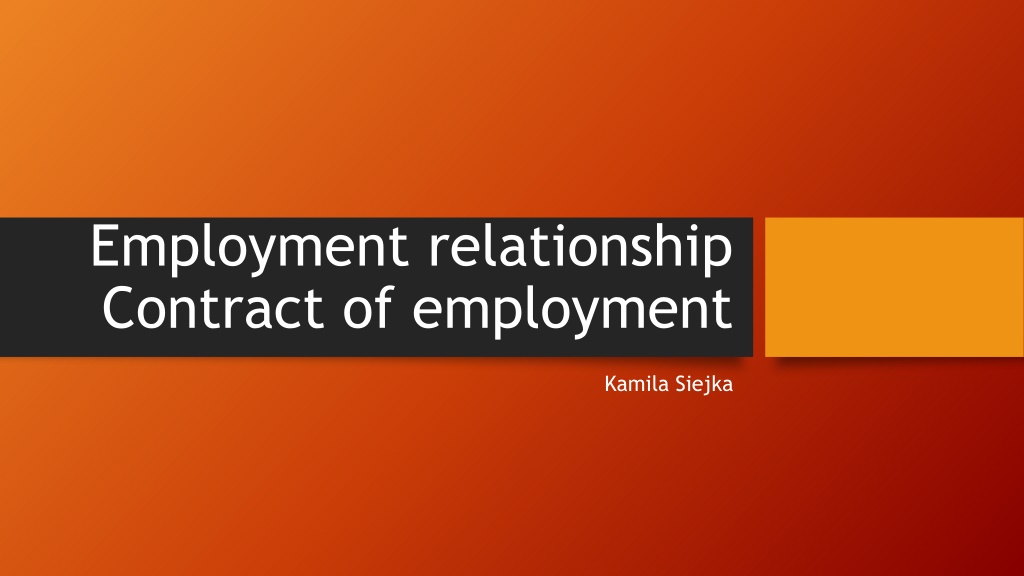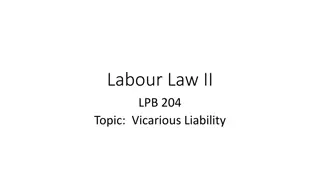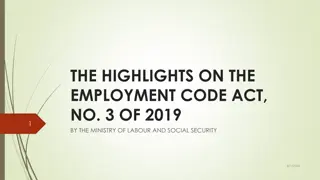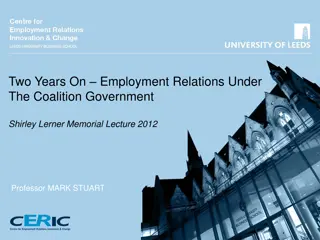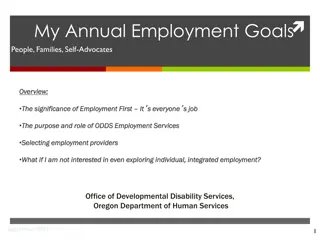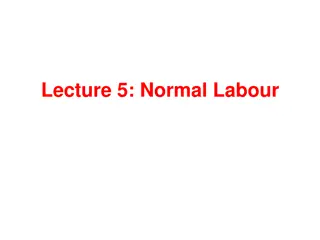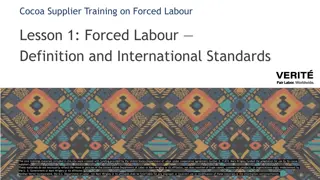Understanding Employment Relationships and Labour Law
This content delves into the intricacies of employment relationships, highlighting the contractual obligations between employers and employees as well as the constitutional principles governing labor laws. It explores the characteristics and legal framework of employment relationships, emphasizing factors such as performance, remuneration, subordination, and working conditions. Additionally, it discusses the hierarchy of laws, collective agreements, and the mutual obligations that define the employer-employee dynamics.
- Employment Relationships
- Labour Law
- Constitutional Principles
- Contract of Employment
- Employment Obligations
Download Presentation

Please find below an Image/Link to download the presentation.
The content on the website is provided AS IS for your information and personal use only. It may not be sold, licensed, or shared on other websites without obtaining consent from the author. Download presentation by click this link. If you encounter any issues during the download, it is possible that the publisher has removed the file from their server.
E N D
Presentation Transcript
Employment relationship Contract of employment Kamila Siejka
Labour law Constitutional principles exclusively the principles of labour law: state supervision of compliance with labour laws (Article 24), right to equal treatment (Article 33), freedom of labour (Article 65), right to the minimum remuneration (Article 65), right to healthy and safe working conditions and right to rest (Article 66), right of coalition and right to bargain collectively, right to resolve labour disputes (Article 59), and principle of social dialogue (Article 20).
Labour law - art. 9 Labour Code Labour law includes the provisions of the Labour Code and the provisions of other laws and implementing acts regarding the rights and duties of employees and employers, as well as provisions of collective labour agreements and of other collective agreements based on the laws, internal rules and statutes concerning the rights and obligations of the parties to an employment relationship.
Labour law - art. 9 Labour Code Labour Code and other laws Hierarchy collective labour agreements and other collective agreements internal rules and statutes
Employment relationship Concept of obligation: mutual obligation of two parities, an employer and employee, under which the employee undertakes to perform work for and under the direction of the employer, against remuneration, and the employer undertakes to employ the employee. Art 22 1. By establishing an employment relationship, an employee undertakes to perform work of a specified type for the benefit of an employer and under his supervision, in a place and at the times specified by the employer; the employer undertakes to employ the employee in return for remuneration.
Employment relationship Characteristics 1) personal performance of work 2) remuneration for the performed work 3) subordination of an employee 4) direction of the employer 5) risk of the employer (economic, personal, social) 6) location of work 7) time-limiting of work
Employment relationship Non-employee employment Employee employment 1) employment contract 2) an appointment 3) an election 4) a nomination 5) a co-operative employment contract 1) institutional 2) administrative 3) penal law 4) civil law (contract for provision of services, contract of mandate, contract for specific work)
Employment relationship Parties Employee art. 2 person employed on the basis of an employment contract, an appointment, an election, a nomination or a co-operative employment contract. Employer art. 3 an organisational unit, even if it has no legal personality, or an individual, provided it employs employees. (managerial concept)
Employment relationship Recuitment internal external Article 51 Constitution of the Republic of Poland No one may be obliged, except on the basis of statute, to disclose information concerning his person. Act of 10 May 2018 on the protection of personal data Art. 22 (1) Labour Code
Employment relationship REGULATION (EU) 2016/679 OF THE EUROPEAN PARLIAMENT AND OF THE COUNCIL of 27 April 2016 on the protection of natural persons with regard to the processing of personal data and on the free movement of such data, and repealing Directive 95/46/EC (General Data Protection Regulation)
Employment relationship Recuitment Data which an employer may demand from a job candidate a) personal data identifying a person (name(s) and surname, names of parents, date of birth, residential address or address for correspondence), b) personal data based on which an employer may verify whether the candidate is suitable for the job (education, employment history) The Regulation of the Minister of Labour and Social Policy of 28 May 1996 on the scope of documentation kept by employers in matters relating to employment relationship and the method for keeping personnel files an employer may demand other personal data, provided the duty to present them results from separate provisions.
Employment contract Contracts of indefinite duration (open- ended contracts) Contracts of definite duration contracts for a probationary period contracts for a fixed term contracts for an indefinite term The contract of definite duration provide that their term is specified and upon the expiration of such term such contracts terminates by operation of law, with no need for any additional activities.
Contract for a probationary period art. 25 optional purpose: verify the employee's qualifications and the possibility of employing him/her to perform a specific job, employee may verify conditions offered during recruitment easily terminable up to 3 months may be concluded only once with one and the same candidate (unless a period of at least 3 years has passed from the date of termination or expiration of the previous contract, of the employee is to be employed for the performance of work of the same type) art. 34; the periods of termination notice: 3 "working" days if the probationary period does not exceed 2 weeks 1 week if the probationary period is longer than 2 weeks 2 weeks if the probationary period is 3 months
Contract for a fixed term art. 25 (1); term must be determined at the time of its conclusion, may be specified as: 1) a period, 2) a calendar date, 3) other further event (certain and not dependent on the will of the parties to the contract or third parties) can be concluded for a maximum of 33 months it is possible to conclude only 3 of such contracts in a row the contract which exceeds the total of 33 months or is a 4th in a row will be considered as the contract of indefinite duration the presumption of existence of the contract for indefinite term does not occur if the contracts have been concluded: 1) for replacement of an employee during his excusable absence from work 2) for the performance of casual work or seasonal work 3) for the performance of work for the duration of the term of office 4) when employer specifies objective causes on the employer's part
Contract for an indefinite term art. 25 does not pre-determine its term is considered most favourable to an employee in the case of any doubts as to a type of the contract of employment which does not specify its term it is necessary (according to Civil Code) to determine the shared intention of the parties, while taking into account the circumstances attending the conclusion, the rules of social coexistence, the established customs
Contract for a fixed term Contract for an indefinite term Common periods of termination notice art. 36 the termination notice period depends on the period of employment notice periods are: 2 weeks if the employee was employed for less than 6 months 1 month if the employee was employed for at least 6 months 3 months if the employee was employed for at least 3 years
Contents of a contracts of employment art. 29 an employment contract must be made in writing mandatory elements of the contract 1. parties to the contract and person authorised to represent legal person 2. type of the contract 3. date of its conclusion, 4. type of work (position, profession, job description, scope of responsibilities) 5. place of performance of work 6. remuneration for work corresponding to the type of work with a specification of the remuneration components, 7. working time 8. date of commencement of work
Contents of a contracts of employment parties may include in the contract also other clauses not prescribed by law provided they do not violate the law or rules of social coexistence the employer must inform the employee in writing, not later than within 7 days from the date of concluding the employment contract, about: 1) the standard daily and weekly working time binding the employee, 2) the frequency of the remuneration payments, 3) the length of annual leave to which the employee is entitled, 4) the length of the termination notice period, 5) collective labour agreement that covers the employee if the employer is not obliged to establish work regulations additionally informs about: 1) the night-time hours, 2) the place, date and frequency of remuneration payments, 3) adopted procedure of confirming the arrival and presence of employees at work, 4) procedure of excusing their absence from work
